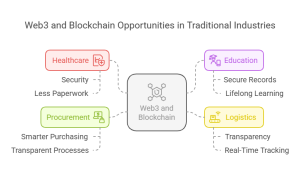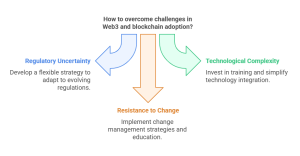Technology is always evolving, but few shifts have been as transformative as the rise of Web3 and blockchain. As the world moves beyond the era of AI dominance, a new wave of innovation is taking over, one that emphasizes decentralization, security, and user empowerment.
Businesses across industries are no longer asking “What is Web3?” they’re asking “How can we use Web3 and blockchain to gain an edge?”
In this comprehensive blog, we’ll explore how BitsWits is helping businesses implement blockchain integration services and Web3 development solutions to future-proof their operations, save costs, and unlock new opportunities.
If you’re a business owner or tech investor, this is what you need to know next.
What Is Web3 and How Blockchain Powers It:
Web3 is the next big evolution of the internet, one that gives users more control, privacy, and ownership of their digital lives. Unlike today’s internet (known as Web2), which is largely controlled by big tech companies, Web3 is built on decentralized systems using blockchain technology.
At the core of Web3 are key innovations like:
- Smart Contracts – Self-running code that automates agreements without needing middlemen.
- DeFi (Decentralized Finance) – Financial tools like lending, trading, and saving without relying on banks.
- DAOs (Decentralized Autonomous Organizations) – Community-run projects where decisions are made by members instead of executives.
All of this is made possible by blockchain Integration Services, a secure and transparent digital ledger that records every transaction permanently. Once information is added, it can’t be changed making fraud, tampering, or data loss far less likely.
For businesses, Web3 and blockchain open the door to safer transactions, faster automation, and a more trustworthy digital experience. These technologies are not just gamechanger, they’re laying the foundation for a smarter, more inclusive internet economy.
Unlock the Power of Web3 for Your Business
Leverage blockchain integration and Web3 solutions to build trust, transparency, and automation with BitsWits.
Get Started Today
Web3? And Why Should You Care?
Web3 is a new version of the internet built on blockchain technology. Unlike today’s internet, which is controlled by big companies, Web3 gives more control to users.
Main ideas behind Web3:
- People own their data
- No middlemen needed
- Anyone can build and join
Real-world examples:
- Web3 lets people manage their own digital identities
- It changes how we use money and data online
Also Read: How to Create a Blockchain Games – (Expert’s View)
Blockchain: The Technology Behind the Web3 Revolution
While Web3 is the vision, blockchain is the engine. Blockchain technology allows for secure, transparent, and permanent data storage across a distributed network. Once a piece of data is added to the blockchain, it cannot be changed, making fraud and tampering almost impossible.
- Stores data in a safe, unchangeable way
- Cuts out middlemen with smart contracts
- Makes systems more open and automatic
Current use cases include:
- Supply chains and logistics
- Digital identity systems
- Real estate and carbon credit tokenization
At BitsWits, we offer custom blockchain integration services to help businesses modernize operations with smart contract automation, tokenization, and App development.
How Web3 and Blockchain Are Creating New Opportunities in Traditional Industries
Web3 and blockchain are no longer limited to cryptocurrency or finance. These powerful technologies are now making waves across industries like healthcare, education, logistics, procurement, and manufacturing. By providing smarter, more secure systems, Web3 development solutions and blockchain integration services are helping traditional businesses unlock new value, reduce inefficiencies, and build future-ready operations.

Healthcare: More Security, Less Paperwork
In the healthcare sector, blockchain for financial inclusion and smart contract automation is a game-changer. Blockchain ensures patient records are stored securely and can be shared instantly and safely between authorized professionals. This reduces data breaches and improves patient care.
Smart contracts can also automate tedious tasks like insurance claims and billing, saving time and reducing errors. For example, a smart contract could trigger payment approval once a service is completed and confirmed, making the process smooth and transparent.
Blockchain also supports drug traceability, helping track pharmaceuticals from the factory to the pharmacy. This level of transparency helps fight counterfeit drugs and ensures patients receive safe, authentic medication.
Education: Secure, Lifelong Learning Records
In education, blockchain makes it easier to verify academic credentials. Digital diplomas and certificates stored on the blockchain are tamper-proof, meaning employers can instantly confirm their validity, no back-and-forth paperwork required.
For learners, Web3 offers the ability to own their entire educational record in a decentralized system. This is especially useful for lifelong learning or non-traditional career paths.
Blockchain integration also supports decentralized learning platforms that cut out the middlemen and connect educators directly with students helping make learning more accessible and affordable.
Logistics: Transparency and Real-Time Tracking
Blockchain is transforming supply chains by offering sustainable blockchain models for real-time tracking, smart contract automation, and fraud reduction.
Smart contracts can automate key logistics processes like shipment tracking and inventory updates. For instance, once a delivery is confirmed, a smart contract can instantly trigger payment to the supplier, reducing paperwork and delays.
With blockchain, every step of the delivery is recorded, giving businesses and customers full visibility. This helps identify bottlenecks, optimize routes, and reduce delivery times, saving both time and money.
Procurement: Smarter and More Transparent Purchasing
Web3 and blockchain are making procurement smarter and more transparent. Through blockchain integration services, companies can verify the legitimacy of suppliers and products before committing to a deal.
Smart contracts simplify procurement by automatically generating and fulfilling purchase orders when stock levels drop. This automation helps avoid shortages and keeps operations running smoothly.
Additionally, blockchain makes it easier to track where materials come from, ensuring ethical sourcing. This level of transparency can enhance your brand’s reputation and build trust with customers.
Manufacturing: Automation, Quality, and Innovation
In manufacturing, blockchain and smart contract automation help track every step of the production process. You can monitor raw materials, automate quality checks, and even schedule maintenance based on real-time equipment data.
For example, if a machine sensor detects a potential issue, it can trigger a smart contract to schedule maintenance, preventing downtime and reducing repair costs.
Blockchain also allows manufacturers to share intellectual property securely, encouraging safe collaboration across companies. This speeds up innovation and helps develop new products more efficiently.
Web3: The Future of a Decentralized Internet
We’re entering a new era of the internet, one that gives users more control, protects privacy, and removes reliance on big tech platforms. This shift is powered by Web3, often called the next-generation internet. To understand what makes Web3 so important, it helps to look back at how the internet has evolved.
A Quick Look Back: Web1 and Web2
Web1:
The early stage of the internet in the 1990s. It allowed people to access information and browse websites, but the experience was mostly passive. You could read content, but not create much of your own.
Web2:
It’s changed everything. This is the version of the internet we use today, filled with social media, mobile apps, and personalized content. It gave us platforms like Facebook, YouTube, and Twitter, where users create and share content. However, it also led to big tech companies controlling user data, raising concerns about privacy, censorship, and monopolies.
Enter Web3: A Decentralized Internet for Everyone
Web3 is the next step forward. It’s being built on blockchain-powered platforms that allow for peer-to-peer interactions without the need for centralized control. This means no single company owns your data or decides what content is shown. Instead, data is stored securely across a decentralized network, giving users full ownership.
At the heart of Web3 transformation are technologies like:
- Smart contracts: self-executing code that automates transactions
- Digital wallets: tools that help users manage assets, identities, and access
- Tokens and cryptocurrencies: used to reward users and track transactions
- Decentralized applications (dApps): apps that run on blockchain networks, not on centralized servers
Common Challenges of Web3 and Blockchain Adoption [How to Overcome Them]
While Web3 and blockchain technologies offer exciting opportunities for industries beyond finance, adopting them isn’t always straightforward. Many traditional businesses face real-world hurdles when trying to integrate these advanced systems. Here’s a breakdown of the most common challenges and practical solutions for overcoming them.

1. Navigating Regulatory Uncertainty
The Challenge:
One of the biggest roadblocks for businesses looking into blockchain integration services is the unclear and evolving regulatory environment. Laws around data privacy, digital assets, and decentralized systems vary across countries, and sometimes even between states.
The Solution:
To stay ahead, businesses should engage early with regulators and legal advisors. Collaborating with legal professionals who understand Web3 development solutions can help companies stay compliant and avoid costly fines or setbacks. Participating in industry groups and discussions can also help shape favorable policies and keep you informed on changes.
2. Tackling Technological Complexity
The Challenge:
Blockchain systems, smart contracts, and decentralized apps (dApps) are still new to many industries. Without in-house technical knowledge, it can feel overwhelming to even get started.
The Solution:
Instead of going it alone, work with trusted providers who specialize in smart contract automation, blockchain infrastructure, and custom Web3 platforms. These experts can guide you through every step, from planning to development to deployment, based on your unique business needs. It’s also wise to invest in basic blockchain training for your team to ensure smoother collaboration and long-term success.
3. Overcoming Resistance to Change
The Challenge:
Introducing blockchain often requires rethinking how things have always been done. This can make employees, partners, or decision-makers hesitant, especially if they don’t fully understand the technology or its value.
The Solution:
Clear communication is key. Explain the benefits in simple terms, faster processes, better transparency, stronger data security, and long-term cost savings. Launching small pilot projects is a great way to show value quickly without requiring a full transformation upfront. Once stakeholders see the real impact, they’re more likely to support broader implementation.
Why Now Is the Time to Embrace Web3
Web3 and blockchain aren’t just buzzwords. They’re already transforming how businesses operate across sectors. Companies adopting them today are:
- Automating manual processes
- Reducing fraud and inefficiencies
- Building deeper trust with customers
And with BitsWits as your technology partner, you don’t have to go it alone.
Step Into the Future with Web3
Partner with BitsWits to explore Web3 solutions that drive trust, automation, and innovation.
Hire BitsWits Web3 Expert!
Conclusion:
Web3 and blockchain are not future concepts, they’re active solutions delivering real results today. These technologies help make processes smarter, safer, and more transparent across many industries like healthcare, education, logistics, and manufacturing.
Yes, there are some challenges, like legal rules and tech complexity, but businesses that start early can get ahead. By using the right Web3 and blockchain solutions, companies can move away from outdated systems and build a better, more user-focused future.
If you’re a business owner or investor, now is a great time to explore how blockchain and Web3 can help your company grow, save costs, and stay competitive. The future of the internet is decentralized, make sure you’re part of it.
FAQs:










